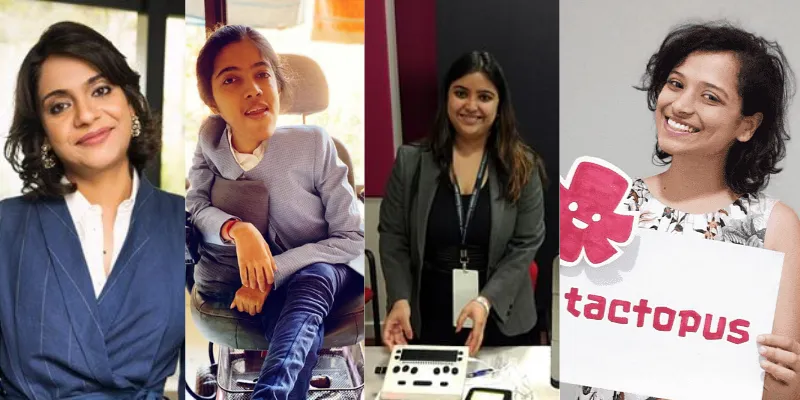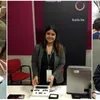These women entrepreneurs are making the world accessible for the differently-abled
On International day of People with Disability (PwD), here is a look at innovation in product and services by women entrepreneurs who are creating a more accessible world.
Different-abled people continue to face challenges despite many campaigns to raise awareness. This is because the world as it functions today are mostly built on a single dimensional view. From infrastructure facilities to social boycott, segregation, etc, they face a number of problems that still need to be addressed.
On International day of People with Disability (PwD), we profile four women leading the change for a more enabled world.
Neha Arora, Planet Abled
Neha Arora did not have a very adventurous childhood. Her trips were confined to school picnics and visits to her grandparents’ as her mother was wheelchair-bound and her father was blind. Travelling anywhere else proved difficult because the places were not accessible for the differently abled people.
Neha was aware that other differently abled people never got a chance to travel. In November 2015, she left her corporate job at Adobe and founded Planet Abled, providing accessible travel solutions for differently-abled people.
The Delhi-based startup facilitates scheduled group tours, local city tours, romantic tours, and customised tours for differently abled people. They are guided and assisted by a dedicated travel buddy like a sign language interpreter and other trained professionals.
Their official launch was marked with a tour to Qutub Complex and Mehrauli Archaeological Park in January 2016.

(From L to R clockwise) Neha Arora, Founder of Planet Abled; Maitri Shah, Founder of Mind Assets; Surabhi Srivastava, Co-founder of Innovision; Saloni Mehta, Founder of Tactopus
Maitri Shah, Mind Assets
Mumbai-based Mind Assets is a tech based startup that helps people with disability to learn job-friendly skills and offer remote digital job opportunities without having to worry about inaccessible workplaces. The edtech startup is working on introducing merit-based inclusivity.
The idea to start up came from her own experiences of being wheelchair bound. Diagnosed with congenital muscular dystrophy that caused weak muscles and impaired mobility at six months, Maitri had an impressive academic record. In 2010, she secured the first rank in MHT CET in the PwD (person with disability) category after scoring 95.09 percent in the SSC examination.
Engaging with differently-abled people through mentorship programmes and online courses, Mind Assets has facilitated many professionals now working as graphic designers, content writers, and social media executives, among others.
Incubated by RiiDL and UnLtD India, the startup secured an undisclosed partial funding earlier this year. Prior to this, Maitri also founded WillsOnWheels, an NGO to empower wheelchair bound people.
Surabhi Srivastava, Innovision
Few visually impaired people in India are Braille literate, keeping them further away from accessing information. This prompted IIT-Bombay alumni Surabhi Srivastava and Shyam Shah to start Innovision in 2015.
The startup designed BrailleMe, an assistive technology that can be connected to any device via Bluetooth or USB to access files across devices with ease. It also works as a Braille tablet in standalone mode with a USB drive or an SD card.
Incubated in SINE (Society for Innovation and Entrepreneurship), IIT-Bombay, the founders believe the portable technology with a tactile screen will help the visually impaired to have access to education and training, and increase employment opportunities.
Saloni Mehta, Tactopus
Bengaluru-based Tactopus enables inclusive early learning experience for differently-abled children. Founded by IIT-Bombay alumna Saloni Mehta, the edtech startup designs tactile graphics and tangible learning solutions.
These include flashcards in braille and tactile graphics, and tactile storybooks, which are supplemented by a mobile application to make them interactive using advanced image processing and augmented reality technologies.
Initially designed for visually impaired children, the startup now caters to children with conditions like Cerebral Palsy, Autism Spectrum Disorder, hearing impairment, speech and language disability, and cognitive disability.
The startup has designed around 12 products with complete Mathematics lessons for first-grade students in partnership with the Maharashtra government. Over the years, it has worked with over 35 schools in India and Singapore.
While the package for first grade education costs Rs 12,000, its range of individual products are available at a price range between Rs 450 and Rs 2,800.
Parents can also consult with developmental specialists regarding doubts and concerns of their child’s developmental milestones on Tactopus.
Edited by Rekha Balakrishnan









![[App Friday] Finch’s gamification of self-care is a hit and a miss](https://images.yourstory.com/cs/2/f49f80307d7911eaa66f3b309d9a28f5/Finch-1655391957378.png?mode=crop&crop=faces&ar=1%3A1&format=auto&w=1920&q=75)
